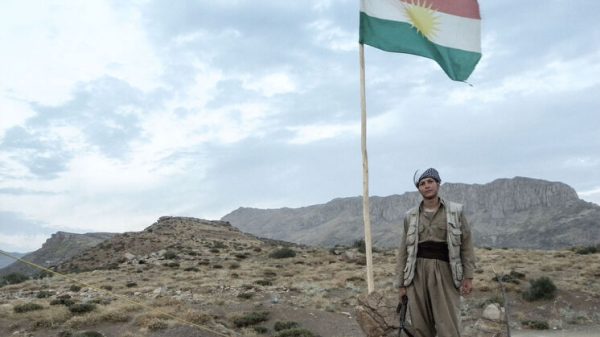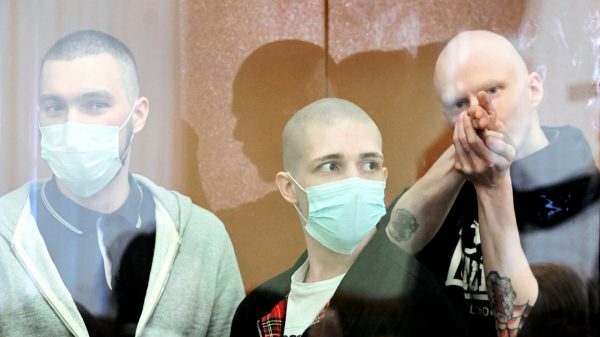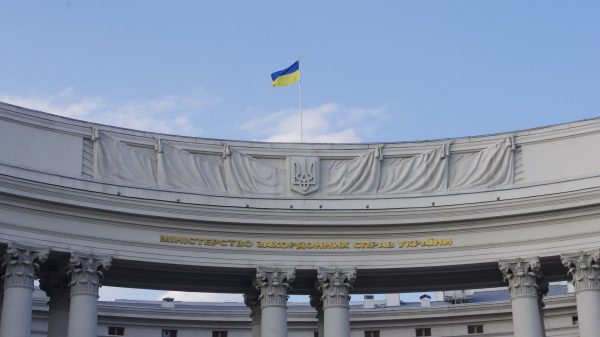
Demonstrators flash the three-finger salute during a protest in Yangon on Monday
Credit: LYNN BO BO/EPA-EFE/Shutterstock
Myanmar’s military have started to occupy hospitals in an alarming new tactic to suppress ongoing mass protests against the coup last month.
Witnesses reported sounds of gunfire or stun grenades in many districts of the commercial capital after nightfall on Sunday night, as soldiers set up camp in hospitals and university compounds, according to local media.
In one video uploaded to social media, repeated gun shots could be heard outside West Yangon’s General Hospital.
In separate footage, residents in other parts of the city responded defiantly to the army’s night operations by setting off fireworks and yelling ‘Happy New Year.’
Just In. Shooting in West Yangon General Hospital compound #WhatsHappeningInMyanmar pic.twitter.com/XBsNsT4qOz
— soe zeya tun (@soezeya) March 7, 2021
The International Physicians for Human Rights Group condemned the occupation of hospitals, saying that it was “appalled by the latest wave of violence by the Myanmar military, including the invasion and occupation of public hospitals and wanton excessive force against civilians.”
It said the military’s actions served to “further undermine a healthcare system already embattled by the Covid-19 pandemic” and the coup.
As mass anti-coup protests swept the nation again on Monday, at least 18 major trade unions, covering construction, agriculture and manufacturing called on members to shut down the economy to back a parallel civil disobedience campaign and raise pressure on the junta to back down.
Allowing business and economic activity to continue would help the military “as they repress the energy of the Myanmar people”, the unions said in a statement.
Major shopping centres, factories and banks remained closed in the country’s main commercial city of Yangon.

A road barricade with sarongs hanging overhead, playing on local superstitions that walking underneath women's clothing is bad luck
Credit: AP
Myanmar’s women led the nation’s snowballing demonstrations on Monday, marking International Women’s Day by mocking the security forces with makeshift banners.
Protesters waved flags fashioned from sarongs, known as htamain, or hung them up on lines across the street while denouncing the junta. The tactic played on superstitions that walking under women’s clothing is bad luck for men, with the hope that it would slow down the advance of police and soldiers.
Two more protesters were killed by gunshot wounds to the head on Monday. Photos posted on Facebook showed the bodies of the two men lying on the street in the northern town of Myitkyina, in Kachin state.
Photos posted on Facebook showed the bodies of two men lying on the street and witnesses told Reuters they were taking part in a protest when police fired stun grenades and tear gas. Several people were then hit by gunfire from buildings nearby.
The violence erupted shortly after local nuns were pictured pleading with officers to show restraint.
Police and military have killed more than 50 people to quell daily rallies, according to United Nations figures last week, although the number is believed to be much higher.

Police officers search for hiding demonstrators during a protest in Yangon on March 8
Credit: LYNN BO BO/EPA-EFE/Shutterstock
Video footage of police brutality towards protesters has continued to flood the internet, showing officers kicking unarmed civilians or beating them with their weapons. In one disturbing video posted by DVB Burmese, a motorcyclist is rammed from behind by a military convoy speeding through the streets of Mandalay.
The Assistance Association for Political Prisoners, a non-profit, said the army was “intentionally terrorising residents” in Yangon, revealing that close to 1,800 had been arrested since the start of the coup.
Myanmar’s junta warned on Monday through a state-run newspaper of unspecified “action” against anyone working for a committee of ousted politicians who have formed a committee to act as the country’s legitimate authority.

Anti-coup protests have continued across the country despite the deaths of more than 50 demonstrators at the hands of the military
Credit: KAUNG ZAW HEIN/EPA-EFE/Shutterstock
Over the weekend, it emerged that the military had hired Ari Ben-Menashe, a former Israeli military intelligence official who has previously represented Zimbabwe’s Robert Mugabe, to help communicate their message to the US and other nations who have strongly condemned their actions.
In a telephone interview with Reuters, Mr Ben-Menashe said the generals were critical of Aung San Suu Kyi’s proximity to China and were keen to leave politics after the coup.
He said they wanted to repatriate Rohingya refugees who fled to Bangladesh in 2017 during a brutal purge, and that the international community “misunderstood” the military regime.

























































Свежие комментарии